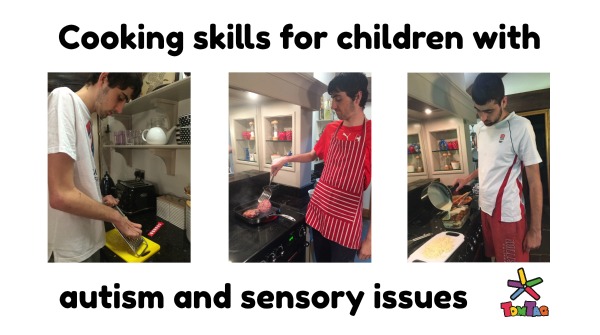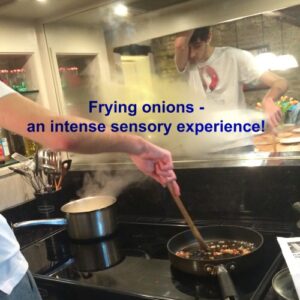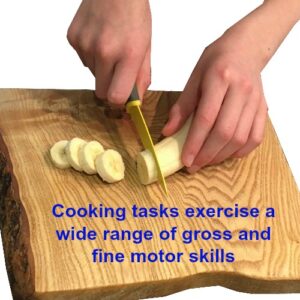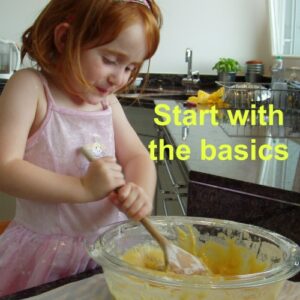
Tom loves to cook and takes a keen interest in meal choice and preparation. We’re immensely proud that he achieved a Jamie Oliver BTEC Home Cooking Skills qualification with the help of two highly skilled and intuitive cooking teachers at school and lots of practice at home.
Learning cooking skills not only benefits a child’s health and well-being but also builds their confidence and independence and boosts life skills in other areas, such as maths, communication and social skills.
Tom has autism, sensory issues, and movement difficulties and finds following instructions tricky; a mixture of challenges that doesn’t naturally suggest a recipe for success in the kitchen! So what happened?
His success certainly didn’t happen overnight. He took many small steps over quite a length of time. We encouraged him through his special interests (like making lorry and number shaped biscuits) and took cues from him as to when he was ready to try new things. There was a lot of planning and preparation and a good-sized dollop of patience!
Are you anxious or worried that similar sensory or motor challenges will make it difficult for your child to help in the kitchen? Does the idea of cooking with your autistic child fill you with dread?!
Be prepared to give lots of physical or visual demonstration, plenty of practice and, above all, be patient. Manage sensory triggers and start with fun cooking activities that match your child’s level of interest and ability. We think you’ll be amazed at how much your child will be able to learn, how creative they can be and maybe even the new foods they might try!
Sensory issues
 Cooking creates a lot of strong sensory experiences like noise, smells and mess that will affect children in different ways.
Cooking creates a lot of strong sensory experiences like noise, smells and mess that will affect children in different ways.
For sensory defensive children (like Tom), certain textures, smells and tastes when handling and preparing food can trigger a negative reaction. Other children who are sensory seekers are more likely to be distracted by trying to satisfy their sensory needs e.g. chewing or constantly wiping their hands. This lack of awareness can be dangerous when working in a kitchen.
It’s therefore crucial to identify your child’s triggers before inviting them into the kitchen and think about appropriate adjustments you can make in order to avoid meltdowns or bad associations with cooking in the future.
Tips to alleviate sensory issues in the kitchen
- Keeping a record of your child’s reactions to sensations will help you prepare dishes that do not include any of these triggers. You can use a simple diary or notebook (like our TomTag Feelings Notebook) to jot down your child’s sensory triggers as well as record your child’s culinary successes.
- Arranging food or utensils is a mess-free food activity for children who love order but aren’t ready for touching food. Let them collect and organise the ingredients, line muffin tins or set the table.
- Exposing a younger child to play situations with various textures like magic sand, slime or play-dough can help to desensitize them to food-type textures.
- Try using thin non-latex medical gloves to avoid skin touching food directly.
- Onion goggles (they really are a thing!) can protect eyes from the chemicals that make our eyes water. A normal pair of swimming goggles would probably work just as well!
- Consider the utensils you use if your child is sensitive to sound e.g. replace metal mixing bowls and spoons with wooden or plastic.
- Offer a long spoon to create a greater distance if your child has food phobias.
- Provide access to sensory props like chewing aids or textured towels so that your child’s sensory needs are supported and managed in a controlled manner.
Motor challenges
 Tom found holding knives and other utensils difficult as the small muscles in his hands didn’t always do what he wanted them to do. He also lacked strength and coordination in his arms which affected his ability to cut, chop, peel or grate. Applying the appropriate pressure for different activities (such as slicing bread as opposed to a banana) was also an issue.
Tom found holding knives and other utensils difficult as the small muscles in his hands didn’t always do what he wanted them to do. He also lacked strength and coordination in his arms which affected his ability to cut, chop, peel or grate. Applying the appropriate pressure for different activities (such as slicing bread as opposed to a banana) was also an issue.
Tips to support children with motor challenges in the kitchen
- Getting the right utensils can make a huge difference. Try supersized cookie cutters to compensate for clumsy fingers or look for child-friendly kitchen knives – we love the look of this simple Ikea set.
- Practice fine motor skills by tearing herbs and lettuce or rubbing butter and flour into a breadcrumb texture (using the ‘rubbing in’ technique for making pastry and crumbles).
- For cutting practice, start with easy to cut food that your child likes to eat. Soft fruit and cooked soft vegetables such as strawberries, banana, potatoes and carrots are ideal.
- There are lots of activities around cooking that involve using different muscles. Mixing is a relatively safe and fun activity. Try pancake batter, dressings or sauces and for added fun you can even try shaking them in a jar!
Following instructions
 Children learn best by example and in small steps.
Children learn best by example and in small steps.
Start by teaching the basic techniques such as cutting and mixing before moving onto the bigger tasks like following a recipe.
Stand next to your child and ask them to copy you step by step. Hand over hand support can help with movement and pressure issues.
Having a relaxed and fun atmosphere is the best way to teach new kitchen skills. Find a time to cook when everyone is happy and calm. Tackling cooking when you’re trying to get dinner on the table or your child is hungry will only lead to frustration and tears – yours and theirs!
Resources for cooking skills
Deborah French is a mother of four children, including 2 with special needs. Deborah’s wonderful book The Cookbook for Children with Special Needs introduces children to the fundamentals of food preparation, healthy eating and cookery skills.
In this interview with the BBC good food guide, Deborah talks about her experiences as a mother, cook and writer and her remarkable journey from parenting two children with special needs to becoming an author of multiple books.
To find out more about using visual prompts like TomTag to help your child build confidence and develop their cooking skills, follow the link to our next blog Simple Meals – TomTag Life Skills.
